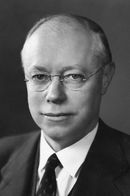Robert Alphonso Taft Sr., born on September 8, 1889, and passed away on July 31, 1953, was a renowned American politician, lawyer, and member of the prestigious Republican Party's Taft family. Throughout his illustrious career, Taft represented the state of Ohio in the United States Senate, briefly held the esteemed position of Senate majority leader, and played a pivotal role as a leader of the conservative coalition comprising Republicans and conservative Democrats who vehemently opposed the expansion of the New Deal.
Taft earned the nickname "Mr. Republican" due to his unwavering dedication to the Republican Party and his influential role within it. In 1947, he co-sponsored the landmark Taft–Hartley Act, a comprehensive labor reform bill that had far-reaching consequences. The Act prohibited the existence of closed shops, introduced the concept of right-to-work states, and implemented regulations to govern various labor practices.
Please provide the text you'd like me to rephrase, and I'll do my best to expand it as much as possible while keeping the new lines intact. Additionally, please let me know if you'd like me to focus on a specific aspect of the text, such as a person's biography.
Robert Taft, the esteemed elder son of William Howard Taft, the illustrious 27th president of the United States and 10th chief justice of the United States, was born in the vibrant city of Cincinnati, Ohio.
Following his graduation from the prestigious Harvard Law School in 1913, Robert pursued a distinguished legal career in his hometown of Cincinnati.
In collaboration with his brother Charles Phelps Taft II, Robert co-founded the renowned law partnership of Taft Stettinius & Hollister.
Throughout his political career, Robert Taft served with distinction in the Ohio House of Representatives from 1921 to 1931, and later in the Ohio Senate from 1931 to 1933.
Although he ultimately lost re-election in 1932, Robert's influence and reputation as a powerful force in state and local politics remained unwavering.

















